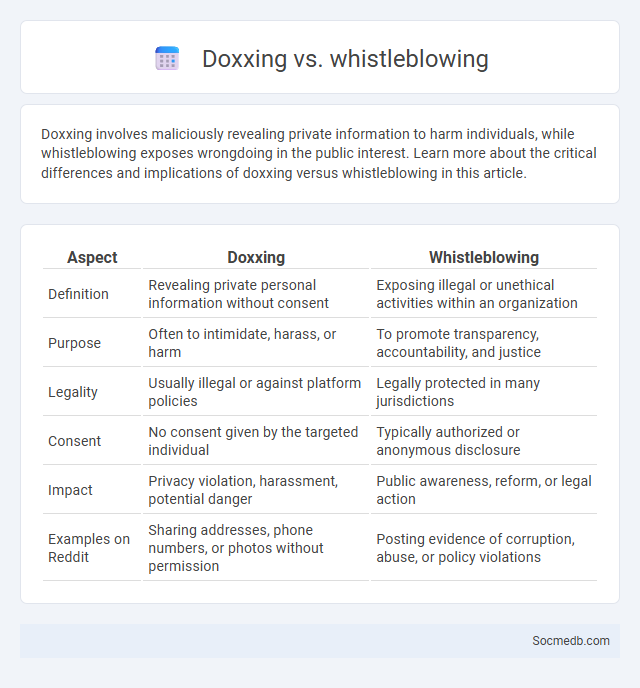
Photo illustration: doxxing vs whistleblowing
Doxxing involves maliciously revealing private information to harm individuals, while whistleblowing exposes wrongdoing in the public interest. Learn more about the critical differences and implications of doxxing versus whistleblowing in this article.
Table of Comparison
| Aspect | Doxxing | Whistleblowing |
|---|---|---|
| Definition | Revealing private personal information without consent | Exposing illegal or unethical activities within an organization |
| Purpose | Often to intimidate, harass, or harm | To promote transparency, accountability, and justice |
| Legality | Usually illegal or against platform policies | Legally protected in many jurisdictions |
| Consent | No consent given by the targeted individual | Typically authorized or anonymous disclosure |
| Impact | Privacy violation, harassment, potential danger | Public awareness, reform, or legal action |
| Examples on Reddit | Sharing addresses, phone numbers, or photos without permission | Posting evidence of corruption, abuse, or policy violations |
Understanding Doxxing: Definition and Origins
Doxxing refers to the practice of researching and publishing private or identifying information about an individual on social media or online platforms without their consent. Originating from the early hacker culture of the 1990s, doxxing involved exposing targets by releasing "documents" or personal data to intimidate or punish them. This act poses significant risks including privacy violations, harassment, and potential threats to personal safety in the digital age.
What is Whistleblowing? Key Concepts Explained
Whistleblowing involves exposing unethical or illegal activities within an organization to protect public interest and promote transparency. Key concepts include confidentiality, protection against retaliation, and the ethical obligation to report wrongdoing. Social media platforms have increasingly become important channels for whistleblowers to share information widely, amplifying their impact and raising awareness.
Personal Information Doxxing: Scope and Risks
Personal information doxxing on social media involves the malicious exposure of individuals' private data such as home addresses, phone numbers, and financial details. This practice significantly increases risks of identity theft, harassment, and cyberstalking, affecting millions globally. Platforms like Facebook, Twitter, and Instagram continuously grapple with implementing stronger privacy controls to mitigate the widespread threat of doxxing.
Doxxing vs. Whistleblowing: Core Differences
Doxxing involves the malicious exposure of personal information with the intent to harass or harm individuals, whereas whistleblowing is the act of revealing illegal or unethical activities to promote transparency and accountability. You should understand that whistleblowers are often protected by law, while those who engage in doxxing can face severe legal consequences. Recognizing these core differences is crucial to navigating social media responsibly and safeguarding your privacy.
Motivations Behind Doxxing and Whistleblowing
Doxxing often stems from motivations such as seeking revenge, exposing perceived wrongdoing, or intimidating opponents, while whistleblowing is driven by ethical concerns to reveal misconduct or corruption within organizations. Social media platforms amplify the impact of both practices by enabling rapid information dissemination and public scrutiny. Understanding user intentions behind doxxing and whistleblowing is crucial for developing balanced content policies that protect privacy without stifling transparency.
Legal Implications: Doxxing vs. Whistleblowing
Legal distinctions between doxxing and whistleblowing hinge on intent, consent, and public interest; doxxing involves maliciously sharing private information without consent, often leading to harassment or harm. Whistleblowing legally protects individuals who expose wrongdoing or illegal activities within organizations, provided disclosures are made in good faith and through appropriate channels. Laws like the Whistleblower Protection Act safeguard whistleblowers, whereas doxxing can result in civil or criminal penalties depending on jurisdiction and severity.
Ethical Considerations: Protecting Privacy and the Public Good
Protecting privacy on social media involves implementing robust data encryption and strict access controls to safeguard user information from unauthorized access. Ethical considerations also require platforms to balance personalized content delivery with transparency about data usage and algorithmic decision-making. You must prioritize these standards to ensure social media fosters trust while promoting the public good and respecting individual rights.
Real-World Examples: Doxxing, Whistleblowing, and Personal Info Leaks
Social media platforms have enabled real-world issues such as doxxing, where individuals' private information is maliciously exposed, posing significant risks to personal safety and privacy. Whistleblowers utilize these networks to reveal corporate or governmental misconduct, often facing retaliation despite their vital role in transparency. Your awareness of these dynamics helps navigate the complexities of information sharing while protecting your digital footprint from personal info leaks.
Safeguarding Yourself from Doxxing and Exposure
Protecting Your personal information on social media is crucial to safeguard yourself from doxxing and unauthorized exposure. Limit sharing sensitive details, adjust privacy settings to restrict access, and be cautious about connecting with unknown users. Employing strong, unique passwords and enabling two-factor authentication further secures Your accounts against cyber threats.
Future Perspectives: Regulation and Digital Responsibility
Future perspectives on social media emphasize stringent regulation to curb misinformation, protect user privacy, and promote transparency in algorithms. Governments and organizations are increasingly collaborating to implement policies that hold platforms accountable while encouraging ethical digital behavior. Your active participation in digital responsibility shapes a safer, more trustworthy online environment.
 socmedb.com
socmedb.com